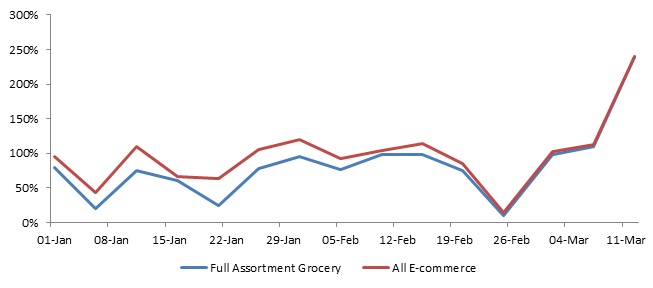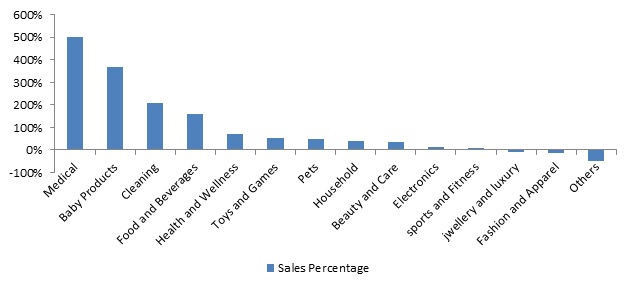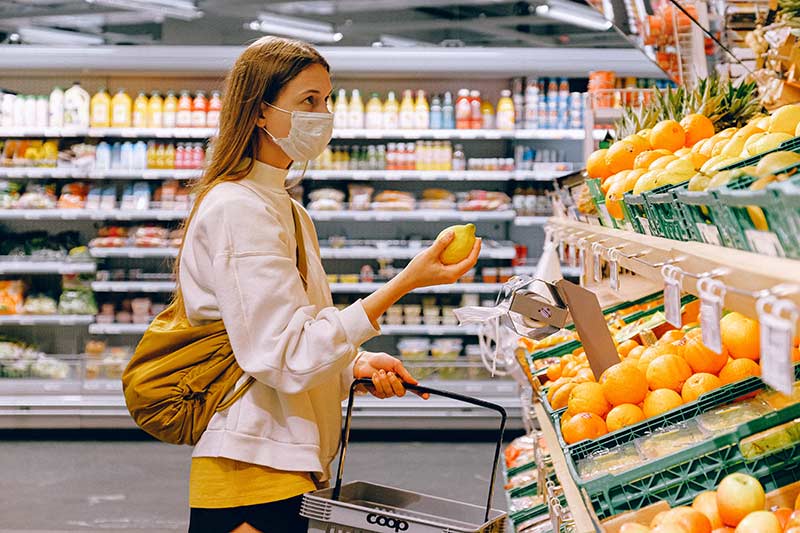COVID-19 Impact on E-Commerce in the Information and Communication Technology Industry
Imbalance of fulfilling the consumer’s demand with respect to groceries and other essentials item has made the e-commerce industry into limelight due to the COVID-19 pandemic. As the people have two options either to visit the supermarket personally or to order their respective product via online.
It has led to the rise in popularity of digital e-commerce web platform like shipt, Walmart, Instacart, Amazon and many more as numerous people finds digital e-commerce services reliable and safe during this time. Almost every customers practicing social distancing rely on this home delivery service the most and are willing to continue this for the next time as well. This has also changed the shopping behavior of the consumers on the geographical level. For instance, it has been witnessed that as compared to U.S., countries like Germany, U.K. and Japan do lack in shopping criteria basically in essential food items and groceries. This can be due to the leniency of U.S. law towards this COVID-19
With respect to shopping behavior while purchasing the item, people have begun stocking the housing essentials including mask, sanitizers, toilet papers and others. This act has negatively affected the overall e-commerce industry to some extent as the companies are failing in fulfilling the huge demand. Thus, this results into an increase in the price of essential items in an uncontrolled way due to this panic buying pattern. It just looks like everyone has to be the leader in the ongoing race of purchasing up unnecessary and irregular items. Based on the gender, it has been noticed that men are less concerned towards the ill effect caused due to this Covid 19 but are active in online shopping. Not only in U.S. there is an increase in new users downloading the wholesale mobile app but it also has be seen an increasing trend from India too. From January 2020, there is almost 50% hike in users who have spent on online and e-commerce app. On the other hand, in South Eastern countries like Thailand, Malaysia and Singapore among others, it has been witnessed a decline in the conversion rates in e-commerce apps. To overcome this e-commerce companies are taking initiatives to shift the consumer behavior towards at a quick rate and have reached more than 1million users on the daily baisis
For instance, Blibli, an e-commerce industry in Indonesia has been providing an easy yet outstanding online shopping experience to its users and has reached more than 1million users on the daily basis through their awareness campaign KarenaSehatNo1 through app push notifications and email.
Changes in the revenue Across E-commerce

Figure: Change in E- Commerce spending (2020)
-
Other E-commerce Categories

Figure: E-Commerce Consumer Sale (COVID-19)
The e-commerce industry has been impacted on both demand side as well as supply side. Virus related products such as soap, sanitizes, mask, tissue and others has witnessed an enormous rise in demand. Due to the imposed of certain limitation, some companies are not able to respond the changes or adapt it quickly.
Apart from this, it has been witnessed a downfall in the sales of fast-moving consumer goods since this time. For instance, in 2020, as per the survey by Digital Commerce in March, out of 304 e-commerce retailers, around 36.0% believed that the business will face a considerable downfall. Shortage in the number of staff is another big problem which makes difficult for the companies to fulfill the orders. For example, BigBasket and Grofers stated that they have the access of only 50% -60% of the staff due to which their frequency of delivery rate has been reduced which ultimately has made a pressure on them for unavailability of the consumer. Likewise, Amazon too permitted for restricted deliveries mainly the essential items and has suspended the deliveries of certain goods due to the shortage of staff and logistical crisis. Kirana shops which previously faced a stiff competition from digital commerce platforms but at this period of time it is considered to be important destination for buying daily and essential items. Thus, Reliance has planned of digitally connecting with the Kirana shops. This will take place soon with the government tapping logistics firms to link these stores with consumers.
Apart from this, many B2B services who are involved into the launch of new platforms in healthcare sector i.e., transporting goods from like vital medical care supplies and ventilators. Many retailers who are especially dealing in essential goods have noticed a boom in their business. Companies engaged into the healthcare amenities consider that customers are indulged into continuous monitoring of their families’ health and fitness which ultimately leads to higher customer engagement. Even the demand for products related to cold and flu has also increased.
Online food delivery platform like Swiggy and Zomato follows the contactless deliveries in order to alleviate the fear with respect to hygiene. But still fear of strict police action against the delivering staff has also created the problem. Such type of hurdle indicates of institutional sickness like unaccountability and in affective communication amongst the local authorities which later acts as a challenge to the flawless delivery of e-commerce products.
Moreover, it has also been witnessed an upsurge in the demand of gaming, new platform and Over the Top (OTT) media. For instance, in the first three month of 2020, Netflix, an online streaming service has added a huge 15.8 million paid subscribers. This was mainly due to the social distancing and lockdown in different parts of the world.
Thus, it can be said that few sectors of e-commerce will definitely boost not only in this current time period but at forecasting period too. But in contrast to it, the challenge will be of balancing up the supply chain by keeping vital safety measures for this pandemic situation. In order to run the business efficiently, it take lot of manpower starting from warehouse management to goods delivering. So, there will be situation like out-of-stock and delay deliveries and others. But Amazon, as an early mover announced of hiring over a million of people for strengthening its delivery fleet globally.
Regulatory insecurity as well as knee jerk reactions in emergency circumstances, cause more harm than good, as obvious from the government’s approach for the supply chain management during pandemic. The government must also provide relief to the small e-commerce players by permitting g them to deliver non-essential goods while practicing social distancing and hygiene. Ensuring regulation, restructuring of foreign investment laws and with better regulatory unity will definitely helps in enhancing the smaller e-commerce players’ growth.
However, the growth of the e-commerce will depend upon only on its service efficiency and adaption level with respect to general consumer psyche in long run. Mostly at this time period, companies which will respond better can able to tap better with the shift towards online purchasing.
E-commerce has even offered benefit to the farmers by making them to avoid middle men and intermediaries and to sell their produce to the wholesaler buyers including agribusinesses, corporate grocery, restaurants and others directly. This has benefitted the farmers not only with enhanced income but also with wastage reduction and enable financial inclusion.
E-commerce is growing at a annual rate of 23% as India, china and U.S. are known to be the biggest contributor for this growth. In today’s scenario mostly these three countries are only highly impacted due to Covid 19. In U.S. till now 10,000 people died while India is still trying to combat the Covid 19 impact with the strategy known as lockdown whereas, China seems to have a control over this pandemic situation. The China’s biggest e-commerce player Alibaba has contributed over USD 2.0 Billion of medical supplies to different countries such as Sri Lanka, U.S., Italy and U.S.
U.S. government is yet to announce any lockdown but the e-commerce stores are still working on and continuously involved into delivering products to its customers. Ever since the outbreak of Covid in U.S. companies like Amazon, Walmart and Instacart have faced a rise in the online orders. It has been witnessed that in first few weeks of March, grocery orders has jumped to 210% and is also expected to remain the same in this post-pandemic.
European Union asked the e-commerce companies to focused on manufacturing, designing and selling the products which are repairable and recyclable in the March first week. But after the rapidly increase of Covid, the e-commerce players were asked to keep a hold on these request and to continue offer the essential services. It results into building pressure from the consumer’s side with respect to catering huge orders on time. This leads to black marketing and hoarding of products and thus to eliminate this, e-commerce site put a restriction on multiple items. Such type of attempt has helped the overall e-commerce companies and even ensures that each customer should have an access to the essential products only.
In U.K. before the lockdown initiation, people got panic and as a result it has raised the sale of specific items including toilet paper, board games, crafts equipment medicines, groceries, home appliances and yoga mats.
China being one of the leading manufacturing and supply hub of B2C players in Asia-Pacific region, now due to the Covid impact, e-commerce companies are trapped and are facing a decrease in the demand as almost every country are into same situation. This has resulted China with a small market as the production is totally stopped and even freight ships are put on hold. To normalize this problem, it would take more time to put everything back into normal.
Singapore’s Health Science Authority (HSA) has detached around 3000 products from an online platform due to fake product’s information and spiked numerical. This was majorly done to enhance its sales and to make money. But the local government sabotaged the evil attempts of the sellers and e-commerce companies are dedicatedly working on delivering the essential item without being overcharged. License of the sellers were suspended who had participated in this money making business. HAS is also working on coming up with a system who will restrict and identifies such sellers from selling online.
In India, extension of the lockdown period has made the e-commerce executives to go to the government for help. A meeting was held amongst Honorary Piyush Goel, Commerce Minister of India along with leaders from DHL, Amazon, Swiggy, Zomato, Flipkart to grant them the permission of selling at least the essential items.
In Australia, e-commerce players have adopted a defensive mode as they are continuously in contact with local municipalities and the government to deliver the essential items on time.
In 2020, the e-commerce industry was expected to do a business of around USD 6.0 trillion but due to lockdown and delivering of only the essential items seems that this number will not be achieved. B2C e-commerce companies can only deliver the essential products and services to their customer but in case players involved in B2B are under the lockdown completely. With the shutdown of the factories, in appropriate amount or nil of raw material, workers at home, blocked logistic services results into no product, no administration and no transaction. Moreover, the e-commerce organization has to keep their warehouse worker and delivery agent safe from this Covid infection. This can be done by taking proper measure like continuous sanitization of the workplace, access to mask, gloves and instant medical consideration to those agents with Covid symptoms so that the respective companies can serve their customers regularly and efficiently.
The coming month is considered to be tough time for the e-commerce industry as increasing number of death rate due to COVID-19 is making the government to release a curfew in many countries. The respective players have to work in close collaboration with the local authorities as well as the governments so as to run their business efficiently by offering in need with helping hand.








